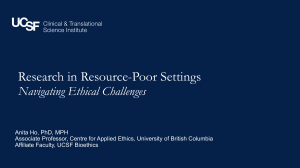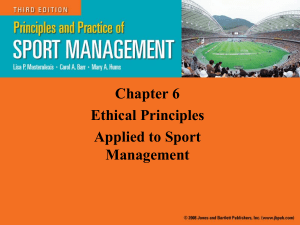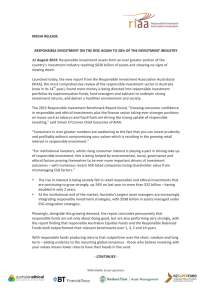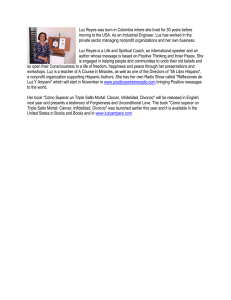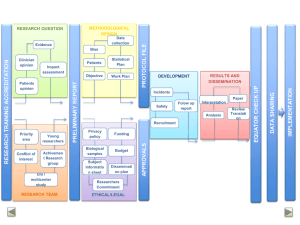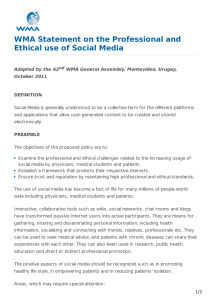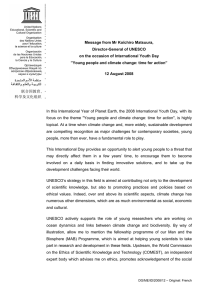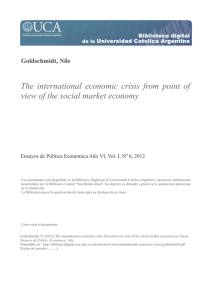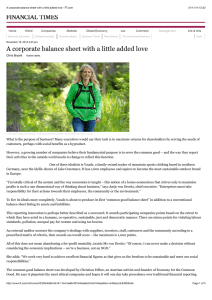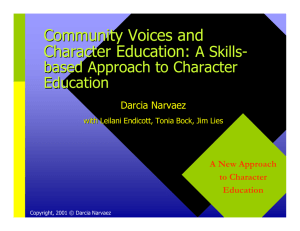Ethical qualities of professional development of the educator a
Anuncio
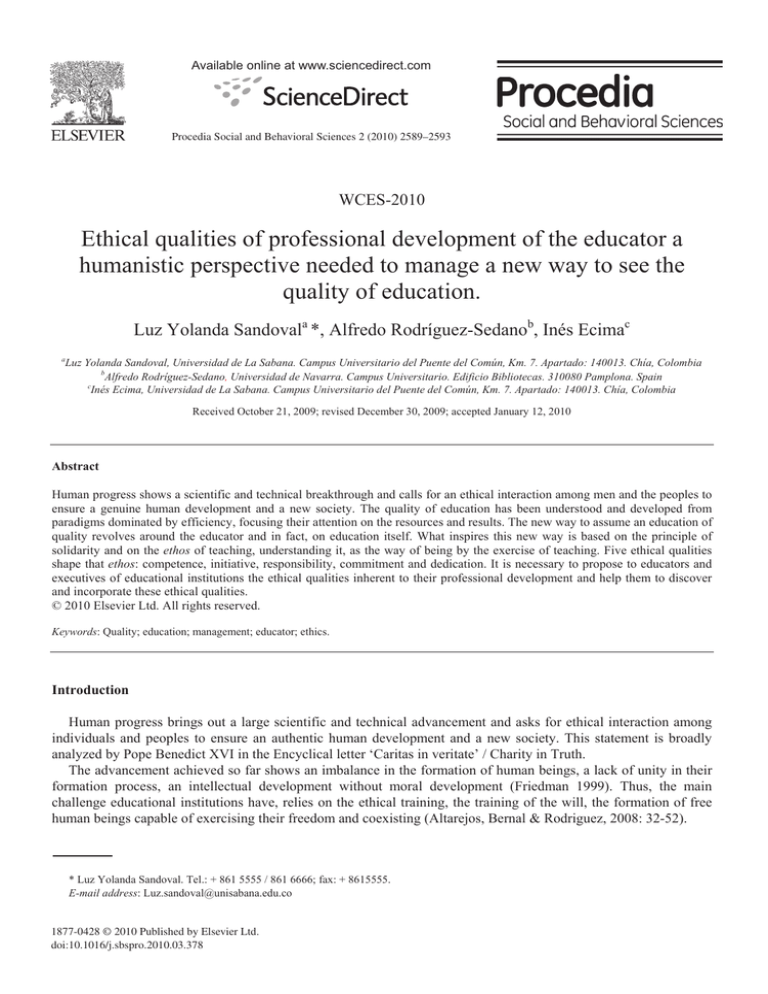
Available online at www.sciencedirect.com Procedia Social and Behavioral Sciences 2 (2010) 2589–2593 WCES-2010 Ethical qualities of professional development of the educator a humanistic perspective needed to manage a new way to see the quality of education. Luz Yolanda Sandovala *, Alfredo Rodríguez-Sedanob, Inés Ecimac a Luz Yolanda Sandoval, Universidad de La Sabana. Campus Universitario del Puente del Común, Km. 7. Apartado: 140013. Chía, Colombia b Alfredo Rodríguez-Sedano, Universidad de Navarra. Campus Universitario. Edificio Bibliotecas. 310080 Pamplona. Spain c Inés Ecima, Universidad de La Sabana. Campus Universitario del Puente del Común, Km. 7. Apartado: 140013. Chía, Colombia Received October 21, 2009; revised December 30, 2009; accepted January 12, 2010 Abstract Human progress shows a scientific and technical breakthrough and calls for an ethical interaction among men and the peoples to ensure a genuine human development and a new society. The quality of education has been understood and developed from paradigms dominated by efficiency, focusing their attention on the resources and results. The new way to assume an education of quality revolves around the educator and in fact, on education itself. What inspires this new way is based on the principle of solidarity and on the ethos of teaching, understanding it, as the way of being by the exercise of teaching. Five ethical qualities shape that ethos: competence, initiative, responsibility, commitment and dedication. It is necessary to propose to educators and executives of educational institutions the ethical qualities inherent to their professional development and help them to discover and incorporate these ethical qualities. © 2010 Elsevier Ltd. All rights reserved. Keywords: Quality; education; management; educator; ethics. Introduction Human progress brings out a large scientific and technical advancement and asks for ethical interaction among individuals and peoples to ensure an authentic human development and a new society. This statement is broadly analyzed by Pope Benedict XVI in the Encyclical letter ‘Caritas in veritate’ / Charity in Truth. The advancement achieved so far shows an imbalance in the formation of human beings, a lack of unity in their formation process, an intellectual development without moral development (Friedman 1999). Thus, the main challenge educational institutions have, relies on the ethical training, the training of the will, the formation of free human beings capable of exercising their freedom and coexisting (Altarejos, Bernal & Rodriguez, 2008: 32-52). * Luz Yolanda Sandoval. Tel.: + 861 5555 / 861 6666; fax: + 8615555. E-mail address: Luz.sandoval@unisabana.edu.co 1877-0428 © 2010 Published by Elsevier Ltd. doi:10.1016/j.sbspro.2010.03.378 2590 Luz Yolanda Sandoval et al. / Procedia Social and Behavioral Sciences 2 (2010) 2589–2593 In recent years, the training of professionals has emphasized more the development of technical skills and competences and very little the development of the ethical competence (Guillen, Fontrodona & Rodriguez, 2007). The ideologies that have featured the postmodernist era have strengthened more the objective dimension of work, than the preponderance of the subjective dimension of work. Universities and colleges are managed based more on the demands coming from these ideologies than on the authentic needs of human beings which take into consideration anthropological and ethical principles. The professional tasks are considered more as an end in themselves and have lost and forgotten that they are a means to attain the ultimate end of human existence, neglecting the nature and dignity inherent to work, in a perspective of integral human development. The training of professionals who devote to education has also been affected by this situation. Although the educational purpose which is explicitly expressed in the Institutional Educational Projects is the formative action, the educational practices in schools and universities, in most cases, do not point at this direction. They provide society with bright geniuses with great intellectual qualities that influence the politics , the economy and organizations, marking a footprint of great scientific and technical capacity and leaving a large gap in ethical behaviour which is reflected in their inability to coexist and live according to their origin, to what he or she has been called or destined. The key to achieve social consistency is the humanization of education, and in this process, the educational institutions play a leading role, to the extent that they promote and attain an organizational culture starting from the development of the personal ethos in each of the actors that integrate their educational community. This challenge can only be achieved if the administrative units at the University, in charge of the teacher training, and the directors of the educational centers contribute through training and perfecting programs to shape the professional teaching ethos (McLaughlin, 2005). According to Altarejos (2003), ethos is a disposition to action which unfolds and develops through the repetition of acts (operative good habits) that enables human beings to perfect the action. The professional ethos of the teacher is the teacher's mode of being that takes shape, while the teacher exercises their profession, through the development of basic and superior virtues and the inherent qualities of the service professions such as competence, initiative, responsibility, commitment and dedication. 1.1. The Anthropological Basis for the development of the ethical qualities in the teacher of the 21st Century Any human action or manifestation is free and therefore it is ethical in as much as the act follows a good. Ethics rules the scope in which human beings manifest. To achieve ethical behaviors in professionals, it is required that they know who the man is and what his purpose in life is (Anthropology). Moral education relies on the truth about man and he needs to discover it in order to guide his action (Carr & Steutel, 1999). The anthropological basis of the ethical qualities for the professional development of a teacher lies on the discovery and acceptance of his personal identity. Knowing the truth about "Who he is" will allow the teacher to accept himself and then to dedicate himself to others; this knowledge will also help him to adequate his behaviour to this truth. If educators themselves do not know who they are, ¿ how can they help others discover their identity, to accept it and act in consequence? To help discover one’s identity, is to help discovering the “who I am”. The teacher is, above all, a "personal being"; he/she is a "somebody" and a "something" (Spaemann 2006). From an anthropological perspective, Rodriguez and Altarejos put forward that the person does not extinguish in his manifestation, in the “something” in what he/she is, in what expresses his/her personal being; above all, the person is a “somebody”, a who, that manifests in those manifestations. The “something” (what is able to manifest), gains sense in the “somebody” (personal being), to whom is destined or is given the “something”. "The human being, in as much as he opens to God in the first dimension of coexistence, looks for the personal acceptance. In this way, he/she opens to his/her Origen seeking his/her identity” (Rodríguez Sedano & Altarejos, 2009: 93). The human being is dual. "The duality made up of the act of being personal and the human essence implies that to each one of them corresponds a growth which means that both are capable of a greater perfection. In this sense, virtue is the end of the human essence; on the contrary, the end of act of being personal refers to the ultimate meaning of life: the free destination of who we are since the perfection that everyone suffers in his human nature has to be destined"(Rodríguez Sedano & Altarejos, 2009: 100). Luz Yolanda Sandoval et al. / Procedia Social and Behavioral Sciences 2 (2010) 2589–2593 2591 "Human growth is essentially a growth through habits of those potencies which are not finished. The growth of a person in relation to his transcendence, is a disposal to a destination, to a donation which is the highest end he/she is responsible for” (Rodríguez Sedano & Altarejos, 2009: 100). Educators are called to seek the truth of their personal project to help others in their searching and acceptance. The truth lies on the Origen, in discovering the identity, knowing who you are, in accepting it and living coherently. To propose the truth and help to discover “Who I should be”, accept that truth Who I want to be?, and assume the commitment on how I am going to achieve it, is the challenge of education which means personal growth Educators should be persons capable of proposing the truth to their students; “ to educate” is “to propose”; the truth is to show the destination; “the truth” is proposed not imposed. We educate people free to make them able to "act", to exercise their freedom and know how to donate themselves and destine themselves to. The teacher's central task is to "form", in other words, to help students grow in the "disposition" and know "to whom they dispose for". The personal growth takes place when you open up to others and are more son of a father. The educator helps and eases this process in the learner when he is an active agent through his educational action and when he chooses the appropriate means and takes into consideration the experience of his own growth. 1.2. The professional development of the educator through the ethical qualities. The professional development of a teacher is achieved by exercising the ethical qualities in the specific professional practices of the educational task of teaching. In this regard, it is very suggestive the proposal put forward by Altarejos (2003) on the professional ethos of teachers. This proposal is based on the assumptions that are stated below. Every professional exercise is accompanied by a professional knowledge. This knowledge is given by a theoretical knowledge and practical knowledge. The first refers to knowledge of what is universal and the latter to the knowledge of the particular and the contingent. The teacher's professional knowledge is based on an educational knowledge and a pedagogical one. Taking the Aristotelian approach into consideration, theory and praxis, poiesis (production) and praxis (moral action), the teacher's professional knowledge is based on a technical knowledge (functional competences) and ethical knowledge (ethical competences). The first is comprised in a technical competence: the know-how and the second, in an ethical competence: to know how to act. The first one characterizes a good professional and implies to be effective and efficient and the second characterizes a good professional and involves consistent actions. There can’t be consistency without efficacy and efficiency. The professional development of a teacher demands the articulation of these two competences "the technique and ethics" that leads the professional in education, not only to be a good educator but also an educator that is good at. The ethical qualities are the basis of the technical competence. Actions that are consistent are based on the moral virtues from which emerge the ethical behaviour that implies a way of thinking about what you do. This means to distinguish the valuable, to want to choose the valuable, to select and accept the valuable and to behave according to this truth and that good. Habit and virtue are fields of the same reality but with a different meaning. A habit is the possession of the faculty resulting from the repetition of acts. On the other hand, virtue is a habit acquired that adds power to and enables the person to act in the future. The qualities acquired in the practice of the profession and at the personal and social levels that are in constant perfection make possible a self-possession and a possession of an eminently ethical character that makes up of the professional ethics. (Altarejos, 2003: 102). "The ethos or character is the mode of being personal which is self-acquired in the daily exercise of one’s freedom itself (...) the habit is a primarily ethical element (...) the habit is the specification of the mode of being of a person" (Altarejos, 2003: 98). Professional habits are not unique to a profession, neither are to each professional. The professional ethos is achieved from a personal ethos that defines the "personal style" within the professional ethos. Professional habits can be seen as concreteness, as specifications of the human ethos. However, aspects or dimensions of common habits contribute to a particular professional ethos depending on its object and to its exercise both in doing the work as well as in the acting, such is the case of teacher's professional ethos. (Altarejos, 2003:101102). Altarejos states some professional virtues which are called the basics. They are the framework of the teaching action, due to the fact they act as a device for teaching: altruism, constancy and patience derived from fortitude, and self-esteem, desire for learning and tolerance derived from temperance. A second group corresponds to the superior 2592 Luz Yolanda Sandoval et al. / Procedia Social and Behavioral Sciences 2 (2010) 2589–2593 professional virtues inherent to the act of teaching, to the carrying out of the educational act: equity, veracity and rectitude derived from justice and solertia and docility derived from prudence. (Altarejos, 2003:103-109) Rodriguez and Altarejos (2009, 100) point out that growth is a strictly personal matter and it is up to every person to make it singular and carry it out. With this respect, Leonardo Polo says “but if growth belongs to every person, in such a way that, at this point, nobody can take the place of another person, what it is then possible and at the same time necessary, is to help the person to grow. Helping to grow is not an arrangement or means just progress, it is an assistance that the person who grows overpays: he pays for it by growing. The most magnificent thing that can be found in this world is a human living growing.” (Polo, 1999, 107) To educate is to help growing (Polo, 2006). From this perspective, Altarejos points out that in the essence of the educational doing and its due professionalism are the notion of help. The relationship of help between the educator and the student is established as a cooperation, support or assistance so the learner procures something by himself, something that he can get and must obtain by himself and this procurement is promoted and fostered by the help of another person who is an expert in assisting to attain such achievement. From this perspective, he suggests five ethical qualities inherent to the assistance professions that with a proper sense, continuity and perfection or betterment in the act of doing could shape the professional ethos of the educator: competence, initiative, responsibility, commitment and dedication. The ethical capacity is acquired through personal effort and is exhibited in the form of acting. The way the person behaves with responsibility, initiative, commitment, gives the person inner form and shapes his character in such a way that is seen as the virtuous acting. This proposal nurtures the perspectives of the teaching profession and constitutes a new horizon from which the recognition and dignity of the teaching profession could be achieved. Altarejos puts forward that it is necessary to look for the truth in every kind of knowledge to the extent that the nature of each issue allows to. The truth about what happens in the teaching profession must be shown and conclusions must be drawn out and consensus must be attained. 1.3. A new way of managing the quality of education in the educational institutions In recent decades, the quality of education has been understood and developed from paradigms in which efficiency is predominant and has focused its attention on resources, and the principle of the result. The management systems implemented in educational institutions to achieve an education of quality have significantly impacted the administrative organizational dimension and have neglected the pedagogical dimension and the formative action of the student. (Sandoval, 2008: 248-251). Sandoval puts forward a new way to manage the quality of education based on the anthropological approach, focusing on the educator and the educational ‘fact’. What inspired this new form of management is based on the concept of education, understood as a help to essential and personal growth, based on the teachers’ professional ethos and taken into consideration the principle of solidarity - anthropological principle that recognizes novelty and the ability of human beings of giving themselves to others. The quality of education from the principle of solidarity is understood as a committed community with the guiding principles of its Educational Project, as a commitment by all the members, as a way of donating oneself in the extent one is, as a manifestation of freedom in order to something. (Sandoval, 2008: 227-250). From this new perspective, quality of education means the commitment of the educational community to the achievement of the educational end: the student who is being educated. The quality of education, understood in this way, is exhibited in the personal and essential growth of the learner; in children, young people, professionals, and citizens capable of assuming life as free human beings able to coexist. Virtuous persons capable of acting consistently according to their origin. Leaders with technical and ethical competence, capable of doing and acting in the economy, in politics ... in every field, making possible a new social order for a progress that is authentically human. Pedagogical management in the educational institutions takes the lead from this humanistic perspective of quality of education. The challenge is to make operative the Educational Project through the formal curriculum and the hidden one. It is necessary to take advantage of all educational areas, both formal and informal to help to shape the personal ethos. This process should be led by a virtuous educator whose footprint is evident on his students, teaching not only what he knows but also what he has come to be. This new approach calls for coherent educators who show Luz Yolanda Sandoval et al. / Procedia Social and Behavioral Sciences 2 (2010) 2589–2593 2593 through their life projects and in their educational doing aspects of their integral development such as the ethical qualities through which they form the new generations and help to reshape the society. The challenge of the training and perfecting programs for teachers is to propose them the development of ethical qualities proper to the teaching profession and help them to discover, accept and cultivate them through their own professional practices. The recovery of the anthropological and ethical fundamentals of the educational content of the training and perfecting programs will enable the teacher to take decisions according to this truth and act in consequence. References Altarejos, F. Ibáñez-Martín, J.A., Jovér, G. & Jordán, J.A. (2003). Ética docente. 2ª ed. Barcelona: Ariel. Altarejos, F., Rodríguez, A. & Bernal, A. (2008). Coexistence in the family, in Bernal, A., Altarejos, F., & Rodríguez, A., Family as Primary Educator. A sociological study, New York: Scepter Publishers, Inc., pp. 32-52. David Carr & Jan Steutel (eds) (1999). Virtue Ethics and Moral Education, London & New York: Routledge. Friedman, T.L. (1999). The Lexus and The Olive Tree, Farrar, Straus, Giroux, New York; ed. Revisada, New York: Anchor Books, 2000. Guillén, Manuel, Fontrodona, J, & Rodríguez, A. (2007). The Great Forgotten Issue: Vindicating Ethics in the European Qualifications Framework (EQF), Journal of Business Ethics, 74: 409–423. McLaughlin, T. (2005). “The educative importance of ethos”, British Journal of Educational Studies, Vol. 53, No. 3, September, pp. 306 ---325. Polo, L. (1999). La persona humana y su crecimiento. Pamplona: EUNSA. Polo, L. (2006). Ayudar a crecer. Cuestiones filosóficas de la educación. Pamplona: EUNSA. Rodriguez, A. & Altarejos, F. (2009). La libre donación personal: libertad íntima y libre manifestación humana desde la filosofía de Leonardo Polo. Cuadernos de Anuario Filosófico, Serie universitaria nº 214, Pamplona, pp. 91-100. Sandoval Estupiñán, L.Y. (2008). Institución Educativa y Empresa. Dos organizaciones humanas distintas. Pamplona: EUNSA. Spaemann, R. (2006). Persons: the difference between "Someone" and "Something", Oxford: Oxford University Press.
